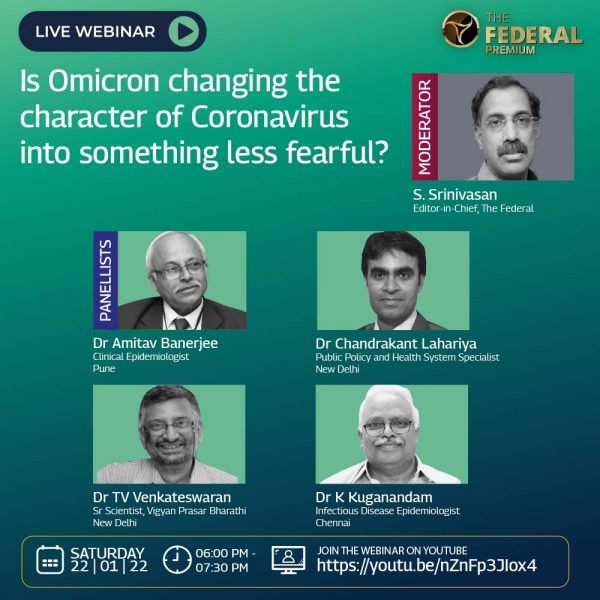
Webinar: Is Omicron changing the character of coronavirus?
Join our panel of experts – Dr Amitav Banerjee, professor and head, community medicine, Dr D Y Patil Medical College, Pune; Dr Chandrakant Lahariya, public policy, vaccines and health systems expert; Dr T V Venkateshwaran, scientist, Vigyan Prasar Bharathi; and Dr P Kuganandam, consultant, infectious diseases and social medicine, SIMS – as they discuss the biggest health emergency of this century so far.

Omicron’s rapid spread could be pushing coronavirus from the pandemic phase to a more manageable endemic phase.
That was the consensus among medical experts from around India who took part in The Federal discussion on the issue on January 22, 2022.
On the panel were: Dr Amitav Banerjee, professor and head, community medicine, Dr D Y Patil Medical College, Pune; Dr Chandrakant Lahariya, public policy, vaccines and health systems expert; Dr T V Venkateshwaran, scientist, Vigyan Prasar Bharathi; and Dr P Kuganandam, consultant, infectious diseases and social medicine, SIMS. The webinar was moderated by S Srinivasan, editor-in-chief, The Federal.
The latest variant of COVID-19 is spreading like wildfire around the world but most of the people infected are being advised to rest at home, said Dr Kuganandam.
“It is time we accept COVID-19 in our midst and treat it like any other viral fever,” he said.
“COVID-19 is becoming an endemic illness like common cold or flu. Flu causes more deaths today than COVID.
“The new Omicron wave is definitely milder. It is only those people who have co-morbidities or have not been vaccinated who are at risk,” he said.
India has robust vaccination numbers, said Dr Venkateshwaran, adding: “If you look at all over the world there is no proper distribution [of vaccines].”
“All vaccines give people considerable protection against serious illness and death… There is no need for lockdowns or other such measures. They will not be helpful,” he said.
There is enough scientific backing to say that a future variant of the coronavirus is less likely to cause major impact than previous ones, he said.
Dr Banerjee said even though Omicron is much more transmissible than previous variants, it seems to be less virulent. “India is reporting two to three lakh cases of Omicron per day but the number of deaths are around 200 to 300,” he said. “Perhaps this is because of India’s young population, but new variants tend to be less virulent.
“It is milder variation that usually have advantage in the evolutionary race,” he said.
Watch the full webinar below.

